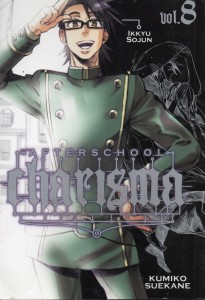Manga Review: Afterschool Charisma by Kumiko Suekane
Shiro Kamiya is an ordinary high school student until the day his father takes a job as headmaster of St. Kleio Academy, and enrolls Shiro in that exclusive school. A very exclusive school indeed, as all the other students are clones of famous historical figures. As the only one without a storied predecessor to be emulated or rebelled against, Shiro is an outsider–only a few of the students warm up to him at first.
It soon becomes evident that there is a darker side to the school when Marie Curie decides she’d rather be a musician than a scientist, she’s “transferred” but she never communicates with those left behind. There’s a mysterious cult that seems to worship sheep, and the staff are evasive on certain questions.
Meanwhile, the most successful graduate of the school, Clone Kennedy, has been elected president of the United States. He’s assassinated at his inauguration by a group that declares the intention to kill all clones. Soon, events spiral out of control as secrets are revealed.
By Volume 8, Shiro has learned that he is not the person he thought he was, but remains confused as to just who he is now. He and Marie Curie (yes, she’s alive) flee after a media presentation at the school goes horribly wrong, meet “Jesus Christ” who is most assuredly not a clone, and discuss the different meanings of “freedom.”
They’re soon recaptured, but another layer of the onion is peeled away. Meanwhile at St. Kleio, one reporter is allowed to remain and interview some of the students, learning more about their feelings toward their situation. And the emotionally fragile Clone Hitler, now with the “resistance”, attacks his former school in the headlines.
There’s some nice art here, although the prettification of all the historical figures makes them a bit blander than necessary. There is fanservice, mostly in the omakes, but every so often in the main story there will be unnecessary underwear shots or focus on cleavage. While the guys are also supposed to be eye candy, there is not nearly an equal amount of objectification for them.
In the early volumes, the students of St. Kleio (named after Clio, muse of history) show a decided lack of curiosity about subjects that directly affect them or are relevant to their survival. One might think that the school has conditioned them into blind acceptance, except that Shiro doesn’t think of these questions either.
And even though multiple revelations have been made about the secret backers of St. Kleio and the fate of many of the clones, it’s still not clear what the actual purpose of the entire exercise is. It’s certainly not to turn out people just like their originals. (As pointed out in the seminal 1973 novel Joshua, Son of None and portrayed by a much better writer in The Boys from Brazil, in order to have the same personality as the original, a clone would have to have the same life experiences. Would Florence Nightingale have the same personality if she were specifically brought up to be a nurse, as opposed to being raised by a family that was strongly against that profession? You bet she wouldn’t.)
I’m not sure the author will be able to come up with a satisfying answer in the end, but the ride has been a lot of fun so far.

